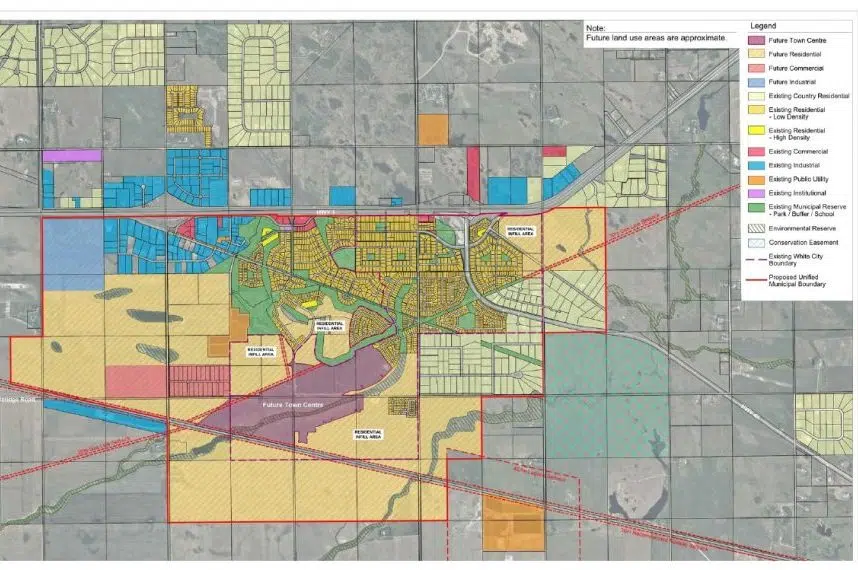White City’s proposal to alter its boundaries and combine a number of communities into one municipality has been turned down by the Saskatchewan Municipal Board’s Municipal Boundary Committee.
The idea was first proposed in 2018 when White City’s then-Mayor Bruce Evans put forward the notion of amalgamating the town with other subdivisions in the Rural Municipality of Edenwold.
In 2019, the town filed an application with the Saskatchewan Municipal Board (SMB) to alter its boundaries and incorporate White City, Emerald Park, Park Meadows Estates, Meadow Ridge Estates, Escott/Deneve, and Great Plains Industrial Park into one municipality.
According to a media release from White City on Thursday, the plan also would include “sufficient additional land to support a well-planned and managed community for the next 25 years.” The move would have involved nearly 4,000 acres of land.
During hearings held from Nov. 23-29 in Regina, White City and the RM of Edenwold put forward arguments about the proposal. On Thursday, the board rendered its decision.
“We are very disappointed in the decision by the SMB in this matter,” White City Mayor Brian Fergusson said in the town’s release.
“We respect the board’s decision but ultimately feel this is setting a dangerous precedent for urban municipalities across the province of Saskatchewan. Our team put together a strong fact-based application which unfortunately did not provide a strong enough case in the opinion of the Municipal Boundary Committee.”
The RM of Edenwold also issued a statement after the decision was released, assuring Emerald Park residents and others who live in the rural municipality that it would “continue providing quality services with the lower tax rates our ratepayers have come to enjoy.”
“With this legal dispute now over, we would sincerely like to offer White City success with its ongoing plans for future development, including developing a town centre,” the RM’s statement added. “With co-operation, both municipalities can prosper and be good partners to all the communities in the region.”
The town claims developments approved by the RM now encompass 55 per cent of White City’s borders, which hinders any possibility of growth. The town suggested that number could rise to 85 per cent if the RM’s 2020 community plan goes ahead.
“The committee’s decision ultimately sets a precedent that rural municipalities can grow unchecked on the borders of urban municipalities,” White City town manager Rodney Audette said.
“This unchecked growth will allow RMs to dictate how, where, and frankly if urban municipalities are allowed to grow at all. It sends a dangerous message that taking a tactic of surrounding and choking out your urban neighbours is an acceptable practice.”
According to the media release, the board’s decision said the town “has not demonstrated a need to annex land to stop the development next to its borders.” White City disputed that notion in the release, but said it will continue to review its own growth plans for the future.







